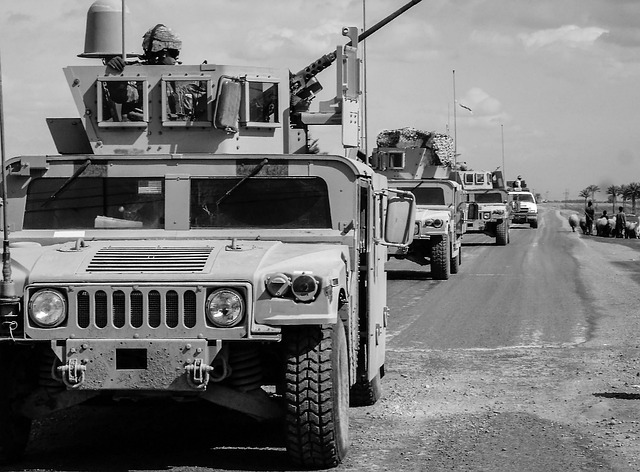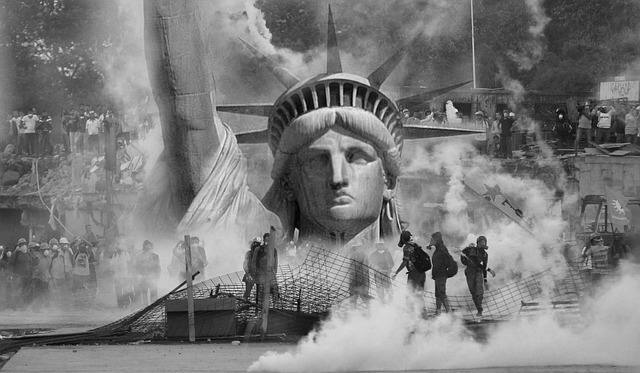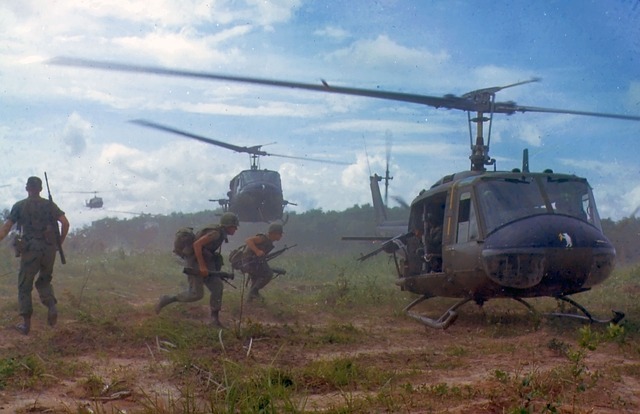I was out grocery shopping a few weeks earlier when a conversation between me and an older gentleman sparked up.
He was probably in his late 60s to early 70s, and the conversation started casually, as most conversations do in a grocery store aisle.
But he quickly started talking about more specific topics like the state of the country and wasn’t too satisfied with how things were going.
After a few minutes of conversation, we parted ways, but I continued to think about some things he said, particularly how he said them.
His comments about living through the Vietnam War era and his projection of distrust in the current government stood out.
As the evening continued, I pondered about some more concepts, like how wars and eras can influence our politics. And how are they affecting, if at all, our politics today?
That’s what we’ll consider in this article, and, in particular, we’ll discuss how different wars can influence our views on foreign policy, why these views trickle down to domestic issues, and how this connection between politics and war is currently playing out.

Politics and War: The Credibility Gap
Before the invasion of Iraq in 2003, most people, politicians, and the media were convinced that Saddam Hussian possessed weapons of mass destruction, and the Bush administration pushed this narrative as the main reason why we should invade.
Fears were high after September 11th that we could be attacked again with these lethal weapons and that Iraq was connected to and sponsored terrorism.
Ultimately, there were no weapons of mass destruction, at which point our involvement in Iraq shifted to another primary reason the Bush administration wanted to invade: to remove Saddam Hussian from power and liberate Iraq.
But there were different views about this reason for involvement.
On one hand, many felt the United States had a responsibility to remove a brutal dictator from power and not make the same mistakes from World War 2.
On the other hand, some felt that getting involved in Iraq would create another military quandary like the Vietnam War.
But both views had one thing in common: they came from the perspective of which war had influenced them the most.
For those more influenced by World War 2, removing Saddam Hussian before he could gain more power, in many respects, justifies the war on its own.
Before World War 2, the major mistake was appeasing Hitler and letting him expand and gain more power. Even with there being no weapons of mass destruction, removing Saddam before he was potentially able to do the same was extremely important.
However, many of those who lived through and were influenced by the Vietnam War saw things differently, especially because of how Vietnam started and played out.
On August 2nd, 1964, U.S. warships were attacked by North Vietnamese ships in the Gulf of Tonkin, off the coast of Vietnam. And by attacked, it meant one bullet hit one of the U.S. warships, the USS Maddox.
What followed was a claim that a second attack took place on August 4th, 1964, but that never actually happened. This was confirmed years later by Robert McNamara, Secretary of Defense at the time of the incident.
But it was because of the first attack and the false claim of the second attack that Congress passed the Gulf of Tonkin Resolution, which gave President Lyndon Johnson the ability to use force against North Vietnam to fight communism.
This erroneous beginning and Americans continually being told the U.S. was winning the war and victory was close created the credibility gap.
The credibility gap was a phrase that became synonymous with Lyndon Johnson and the government at the time due to these false claims.
This was further exacerbated by the Pentagon papers, classified documents released in 1971 by the New York Times that verified the Johnson administration had lied about the war to the people and Congress for years.
Needless to say, those who the Vietnam War influenced most were skeptical of involvement in Iraq, especially after no weapons of mass destruction were found.
And maybe more importantly, the War in Iraq worsened the credibility gap among those influenced by Vietnam.
Because once again, we had a war in which the government presented false claims and maybe even lied about those claims.
A war in which President George W. Bush declared victory but was followed by continuous years of fighting and mounting military casualties.
The credibility gap has, in a sense, doubled, which is why I feel so many people on both sides, especially from the older generations, strongly distrust the government.
However, this credibility gap is not just reserved for foreign policy issues and generational attitudes; it also directly affects how we look at domestic issues and current events.

Politics and War: Domestic Intranquility
Wars are significant events that become essential issues while they happen but also change how we think about our political environment and domestic issues afterward.
For example, the Vietnam War changed people’s thoughts about the government and whether they could trust it. A trust that was broken until Presidents like Jimmy Carter and Ronald Reagan restored more faith.
This distrust bleeds into domestic issues because if you can’t trust the government with the most crucial situation of all, war, how can you trust them with anything else?
The 2008 financial crisis is the perfect example of this because I feel those feelings from Iraq directly influenced the distrust of the government’s actions in response to the crisis.
Many people were angry with how the government handled the economic recovery, and it created movements like Occupy Wall Street and the Tea Party, which I discussed with more specifics in my article Inflated-Fed Head.
But would this have happened without the distrust created by Iraq?
I think it would have been different.
The anger and formation of the movements mentioned above were of direct populist sentiments, the people versus the political establishment; see my article Political Efficacy for more on these specifics.
However, where would that strong sense of anti-establishment have come from without Iraq?
Sure, the baby boomer generation’s inherent distrust of Vietnam was there, which was the whole point I made in the last section, but Iraq fueled those flames.
And while the 2008 financial crisis would have sparked something, just a government bailout to save the economy would not have had as much anger and skepticism behind it.
Also, who even knows if the financial crisis would have happened if we didn’t get involved in Iraq or if September 11th didn’t happen?
Retrospect, obviously, but that’s the point. That’s how much influence wars and significant acts of war, like September 11th, have on domestic issues.
Ultimately, our current political environment can also be traced to everything we have discussed because even the ideologies of the political parties have changed due to wars.
The Republican party has been completely transformed and is controlled by the far-right wing, whose whole ideology is based on distrust of the government.
A distrust that would not be able to take form without the influence of Iraq and the added influence of Vietnam.
Unfortunately, it has also created a Republican party that is much more isolationist, the opposite of what its foreign policy was under Ronald Reagan.
A party that now calls to end American aid for Ukraine in its current war with Russia, an almost perfect example of how Iraq changed the party.
The Democratic Party, however, is more split between moderates and far-left progressives, but far-left progressives have also gained ground because of distrust.
Politicians like Bernie Sanders, who opposed the War in Iraq from the beginning, became popular on the left because they called for the end to endless wars and the money spent on them by the government.
This ideology probably wouldn’t have legs without Iraq and many liberals of an older generation who opposed the Vietnam War years ago.
Overall, there’s no denying war has a major influence on politics and our current events.
But this doesn’t have to be permanent and likely won’t be.
After all the turmoil and government distrust brought on by the sixties and early seventies, new leaders like Carter, Reagan, George H.W. Bush, and Clinton restored more faith in the government and brought better ideologies back to the political process.
Hopefully, new leaders and better ideologies will emerge again soon and help us regain some faith in a political environment that sorely needs it.
